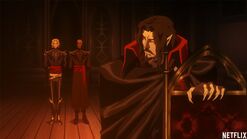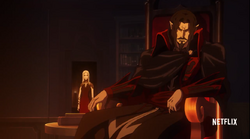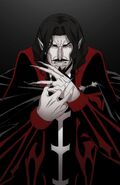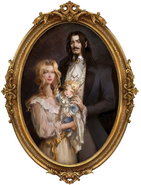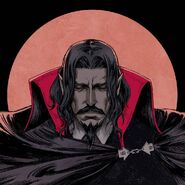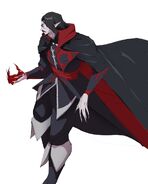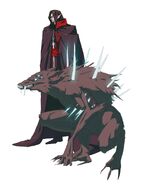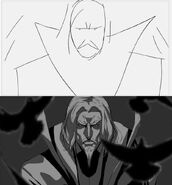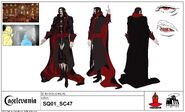

- "You took that which I love, so I will take from you everything you have and everything you have ever been."
- — Dracula in Witchbottle
Vlad "Dracula" Ţepeş is the main antagonist of the first and second season of the Netflix original series, Castlevania. He is the father of Alucard, as well as the widower of Lisa Ţepeş.
He is voiced by Graham McTavish in the English version of the show.
Character's history
Early life
During the late medieval period of Europe in Wallachia, there was a vampire named Dracula who had a dislike of humans, going so far as to kill his victims with impalement and killing entire villages should they wrong him. Despite his sheer brutality, he possessed vast scientific knowledge. He lived alone in a moving castle fortress called Castlevania.
Meeting Lisa
In 1455, he had an unexpected visitor: a woman named Lisa who was conducting research to improve medicine and wanted to become a doctor. She had come to Dracula to learn of the science that only he knew, but he threatened her with his distrust of the humans. To his surprise, Lisa was not afraid of him, and she encouraged him to explore the changing world. Finding himself attracted to her, Dracula welcomed Lisa into his home.
At some point later, Dracula married Lisa. Together they had a son they named Adrian, who would later be known as Alucard. They then lived in a cottage outside of Targoviste, Wallachia, where Lisa continued her research into medicine. At his wife's behest, Dracula traveled across the world to learn from its people and humanity. During his travels, he met and befriended two misanthropic human Devil Forgemasters, Hector and Isaac.
War on Humanity
In 1475, Vlad’s happy days with Lisa came to an abrupt and tragic end. One night, while returning home from his travels, he discovered that the cottage was completely burned down. He then encountered Mrs. Djuvara who was treated by Lisa. While she was laying flowers, Vlad learned from her that Lisa was arrested on false charges of witchcraft, and she was sentenced to death. Enraged, Vlad abandoned his human identity and became Dracula once more. He then warned Mrs. Djuvara to take her family and leave Wallachia before teleporting away in a pillar of fire.
Arriving at the site of Lisa’s execution, Dracula demanded to know what happened to his wife. When the Bishop proclaimed that she was a witch and that he himself was just a myth, the vampire was angered and gave the people of Targoviste one year to make their peace with God before his return to destroy them. Returning to his castle, Dracula prepared to summon an army from Hell within one year. But then his son Alucard appeared and begged him not to kill innocent people. Dracula shouted that there were no innocents left because no one acted to save Lisa. Alucard attacked Dracula but was swiftly defeated, and was allowed to leave afterwards.
Dracula approached both Hector and Isaac respectively to help create his new army, to differing perspectives as Isaac immediately understood the need for genocide while Hector preferred a more humane way to culling humans. Nonetheless, both parties agreed to aid the former in building an army of Night creatures from the dead.
One year later, Dracula appeared in Targoviste, as promised, to the Archbishop and people celebrating Lisa’s death and calling his existence a farce. He unleashed his army on Targoviste, massacring the populace, and the horde proceeded to descend upon the rest of Wallachia.
Depression and betrayal
As the war dragged on and word of his horde's failure in killing the people of Gresit, Dracula calls upon his generals, vampires from across the known world, into his castle to discuss strategy. His war council protests the state of the war, particularly the lack of strategy, in which Dracula introduces his Devil Forgemasters, Hector and Isaac, to his council as his newest confidants to lead the war more effectively. This decision sparks discord and outrage from the vampires but Dracula silences their protests. Despite his, arguments continue to run rampant within the vampire leadership, with Dracula either desponding in his study or growing irritated with his vampire's squabbling. Soon enough, the deadly vampire mistress, Carmilla, arrives. However, instead of providing stability, she questions Dracula's priorities in the war, beginning with the question on why he hadn't turned Lisa into a vampire in the beginning, enraging Dracula considerably.
Unknown to Dracula, Carmilla schemes to assume power over the vampire world by inciting disloyalty among the vampire generals and even Hector and Isaac. Though she successfully manipulated Hector, Isaac is loyal to Dracula to a fault. Even the vampire viking, Godbrand, begins to question on what the vampires will do in the future once humanity is extinct, fearing on what the vampires will feast on. Dracula expresses only disinterest and anger with Godbrand's concerns, which the viking takes this as Dracula wanting to die so he join his wife and is willing to have every vampire starve in the attempt, thereby confirming that Dracula has gone mad.
The situation between the vampires and their lord becomes more complicated when details of the failure in Gresit comes to light: that the villagers had help from a Belmont and that Alucard has awoken. Though unconcerned with Alucard, the revelation that a Belmont, one the few forces in the world that can truly threaten the vampires, remains alive sparks surprise and fear within them.
Final stand and death
Ultimately, the vampires grow tired with their current state and decide to invade the town of Braila and feed on its people. In this moment, Carmilla makes her move against Dracula, having the majority of her forces storm his castle and kill him. However, her usurpation is crushed as Dracula kills most of her forces and Alucard, Trevor Belmont and Sypha Belnades arrive and kill the vampire generals. Isaac confirms Alucard's presence and that of the Belmont's, advising Dracula to return to his study with the Forgemaster swearing to protect him. Dracula is touched by Isaac's loyalty and decides to spare him from the intruders by sending him to the desert from whence he came, to Isaac's shock and protest.
Alone in his study, Dracula finally confronts his son again, who states that his war is over in the name of his mother. Dracula counters that it endures in the name of Lisa. Regardless, though Alucard grieves with Dracula in Lisa's death, he refuses to allow him to commit genocide. Dracula remains unfazed, remembering and reminding Alucard that he couldn't stop him before. Alucard agrees but counters that he was alone before, in which Trevor and Sypha enter, ready to face the Vampire Lord.
Though Alucard initiates the attack, Dracula easily beats back his son and his allies but together, they gain the upper hand in wounding Dracula. Trevor's skill with the Morning Star whip, both wounds and enrages Dracula enough to summon a fiery ball of magma at the trio. Despite his power, the three combine their strength to push the fiery orb back, destructively sending him and Alucard through the castle to the central library. There, father and son engage in a vicious and brutal fist-fight that takes them both throughout the castle but it becomes apparent that Dracula is the stronger of the two. At which point, Alucard arms himself with a wooden stake and states that Dracula knows he died when Lisa did and that he wants to die, calling his war, "history's longest suicide note." Dracula, angered once again, strikes at his son, forcing Alucard to strike at his father with the stake but misses his heart.
Dracula continues to beat his son deeper through the castle but Alucard refuses to back down, despite being overpowered. Ultimately, their battle takes them to the room where Alucard grew up, the very room he and his beloved Lisa built for their son. Seeing the room and remembering the memories he shared with his wife, restores a semblance of his sanity, realizing that he is killing his son, the greatest gift Lisa ever gave him. In his deepest moment, Dracula confirms that as a result of his actions, he should already be dead. In this moment, Alucard arms himself with a wooden stake again from his bed post and stabs Dracula with a heavy heart and crying tears of blood.
Dying, his body rapidly decaying, Dracula's form closes in on Alucard but before he can do anything, Trevor and Sypha arrive and the Belmont decapitates Dracula with Leon Belmont's longsword, thereby killing Vlad Dracula Ţepeş. Sypha then uses her magic to burn Dracula's remains which erupt into a fearsome demonic black cloud that spreads across the castle before dissipating completely, leaving behind only his wedding ring.
Legacy
Dracula, the most powerful vampire in the world, the apex of his kind, would die a broken man as a result of the actions of the church, forcing his son and heroes of humanity to rise up to end his madness. Though Alucard had committed the deed, he states that Dracula died long ago, when Lisa died. With his castle empty and the knowledge within too important to leave behind unattended, Alucard decides to take custody of the castle to ensure the knowledge within is not pilfered. Trevor even offers Alucard the remains of the Belmont Hold to also ensure the safety of the knowledge the Belmonts collected. Alucard, surprised and grateful, accepts. Trevor and Sypha then depart to forge a life together, leaving Alucard in the castle, where alone in a study, he grieves and weeps at the loss of his loved ones.
In the vampire world, the deaths of Dracula and his generals leaves a power vacuum, one that Carmilla intends to take advantage of. She betrays and enslaves Hector, hoping to use his abilities as a Forgemaster to replenish her forces to assume control over vampire-kind, returning to Styria with Hector in chains. In addition, within the desert he was banished to, Isaac resolves to continue Dracula's war on humanity on his own terms, killing humans he comes across and turning them into demons for his own army, beginning with a group of bandits.
Personality


- "Kill everything you see. Kill them all. And once Targoviste has been made into a graveyard for my love, go forth into the country. Go now. Go to all the cities of Wallachia: Arges! Severin! Gresit! Chilia! Enisara! Go now and kill. Kill for my love! Kill for the only true love I ever knew. Kill for the endless lifetime of hate before me."
- — Dracula in Witchbottle
At this time, it is not clear how much traditional Dracula and Castlevania lore applies to this Dracula's background. Thus, Dracula's background is largely a mystery. What is clear is that by 1455, he had once killed humans and been in conflict with Leon Belmont, but now avoided them and lived an isolated life in Castlevania. Given Dracula's extreme intelligence, physical superiority, and discussion with Lisa, it is strongly implied he sees humans as far inferior life forms. Where he was once involved in human affairs, by 1455 he didn't see the point in wasting his time with "peasants".
While intelligent and lordly in stature, Dracula lacks charm. He has a feral and threatening nature to him that is only accentuated after Lisa's death. While many would use weapons in combat, he is known to use his own claws like a lion or bear. Lisa herself noticed his lack of charm and suggested he could relearn manners from her. During his married years, he took this to heart and had a far more human bearing than usual.
Before he fell into insanity and depression, Dracula would suffer no insult and delighted in meticulously planning vengeance on those who did so. Using both his supreme power and mind, he would maneuver his prey before surgically striking at his targets. This was demonstrated when 40 merchants offended him. He issued a threat which insured the innocent woman and children fled and understood the psychology of the merchants, that they would stay in town to protect their gold. He would then kill those 40 men and only those 40. Showing the rest of the town mercy but perhaps doing so to make it abundantly clear that his massacre was not random; that was the cost of a transgression against Dracula. This would change in his war on humanity where Dracula was bereft of pleasure, only desiring the death of everything.
When Dracula and Lisa met and she requested to learn from him, they quickly developed a strong mutual attraction. Neither had met anyone like the other before. Dracula was, of course, attracted to Lisa's beauty but even more so by her character. He described her as being "definitely different to most humans" he had met. Lisa's courage, civility, intelligence, and good-hearted nature impressed him and he allowed her to study under him. They soon married and had a son, Adrian Ţepeş.
Lisa saw the best in Dracula and immediately acknowledged he had the potential to improve the lives of humans everywhere with his knowledge. As per Lisa's wishes, he would spend much of his time traveling. It was her hope that he would also learn from his travels and humans as she did from him. Dracula himself seemed to appreciate her encouragement, although his later actions imply he never was able to see other humans the way Lisa wished he would. If anything, the light of his experiences only turned into more ashes after he returned to his home and was informed that his wife had been executed.
When Lisa was unjustly killed in 1475, Dracula grew to deeply resent humanity; no longer did he consider them peasants but he now considers them all animals he could no longer tolerate. He would later admit that she was the only true love he had ever known. Immediately after Lisa's bones burnt into ashes, Dracula rose from his wife's flames and demanded an explanation. He was enraged to learn that his wife had been killed out of unjust dogmatic stupidity and further enraged when the Bishop who ordered the execution denied Dracula's existence. In that moment, Dracula proclaimed he would take everything from the citizen's of Wallachia and leave no signs they ever existed. Although he surely knew his wife wouldn't want him to take vengeance, his heart was now so embittered that it is filled with nothing but absolute misanthropy. Dracula believes that every human is guilty for his wife's death as none did try to stop the unjust murder and hence when Alucard tried reasoning with his father to kill only those responsible, Dracula angrily refuted this. To Dracula, Lisa was the one good thing humanity had ever produced and humanity had killed it.
He was even more than willing to severely injure his own son, Alucard, when he tried to reason with him and stop him from committing genocide. Despite all of this, Dracula does seems to retain fractions of what he became after marrying Lisa. For example, even though he had Alucard in his mercy, he did not pursue him any further after inflicting a severe injury on him, which seems to show that the only person who Dracula has any remaining attachment to was his son, as he could have killed him easily but let him escape, apparently meaning he simply wanted to incapacitate Alucard long enough for his massacre to be completed. He also notably uncharacteristically had a woman who still showed great adoration to Lisa live and even warned her to flee, showing he at least has a softer side for those who was not blinded by the accusations of the reasons of his wife's death enough to not want to kill them. It is worth noting that he also issued a one-year warning to humanity to make peace; Dracula was further disappointed in humanity that no humans heeded his warning or repented to him, saying to them before unleashing his army that "you had your chance".
One year later, Dracula began his war of extermination, unleashing an army of Hell on Targoviste, bidding his army to kill all humanity and accepting his future eternity of endless hatred. Despite being on a revenge quest to wipe out all of humanity, Dracula grows more and more despondent as time passes, largely isolating himself from the rest of his court and leaving command of his army in the hands of his forgemasters, Hector and Isaac. He doesn't care much for strategy, as long as all of humanity dies at the end, much to the discomfort of his generals. Dracula planned to use machines to turn the sky dark and allow vampires and the night hoard to rule the world. However, many of his generals and Alucard observe that Dracula's plans are self destructive. Godbrand realizes that human genocide will mean the end of the vampires food supply and that no one would survive Dracula's plans for the world. Alucard observes that Dracula's is dragging the whole world with him on "history's longest suicide note."
When Alucard assaults his castle with Trevor and Sypha, Dracula shows great care toward Isaac by banishing him to the desert, not wanting his friend to be killed. Dracula truly admired Isaac's unshakable loyalty, acknowledging him as being one of the greatest of his species. He ruthlessly overwhelms and beats on Trevor and Sypha, mocking them for their inferiority, but never strikes the fatal blow on Alucard, mostly ignoring his son unless he attacks him, at which point he savagely strikes back but does not deal any truly decisive blow. Only after being sufficiently angered was he willing to brutalize his son but even in such a murderous rage, his love for his son shone through when after arriving on the room where he and his wife raised Alucard, Dracula finally snaps out of his murderous rage and is driven to tears by the realization that he was killing the greatest treasure Lisa ever gave him. Dracula realized in this moment that Alucard had been right about him, he had been dead on the inside and fallen into insanity on the day that Lisa was killed. He allowed himself to be killed by his son afterward.
To put it simply, Dracula is a broken and bitter man who tries to kill all of humanity in revenge, but doesn't feel pleasure or joy in this, nor does he care about the fact he could potentially starve his own army to death in the process. He is so detached that Alucard believes that Dracula only waged war on humanity because he wanted to die, for he is figuratively dead without Lisa. Dracula died as a broken being but also expressing what love he had left towards his son; the greatest gift his beloved wife had given him, which was what allowed him to finally be at peace as he reunited with his wife in the afterlife. Dracula's spirit briefly appeared before Alucard and showed no hostility, nodding curtly before disappearing, apparently making peace with his son.
Powers and abilities
Powers
- Vampire physiology: Dracula is known for being the strongest vampire in the world. He possesses many of the usual features of vampirism: fangs, claws, pale skin and drinks blood. He does not seem to be subject to regular weaknesses of vampires, as seen by how he wonders aloud if Lisa was armed with silver, crosses and garlic; calling them superstitious, implying he is immune to them or at least they only have minimal effect on him. So far Dracula has not been seen in sunlight, although he traveled on foot around the world for many years, implying he was immune to it as well. He can go on without drinking human blood without issue, as seen by how he, in his depression over Lisa's death, sat on his library without drinking any blood for months and proved to be still in full power when he fought directly. The only confirmed weakness of vampires working on Dracula is a stake driven directly into his heart, along with decapitation.
- Immortality: Dracula is immortal and cannot die of old age. The specifics of his immortality are not yet clear.
- Extreme physical superiority: Being an immortal, Dracula retains his physical prime and despite his towering appearance, he has extraordinary superhuman strength, speed, durability, endurance, and reflexes beyond his appearance. He is able to easily smash hard objects like solid stone with his bare hands and overpowered and severely injured Alucard in an instant despite Alucard's own great resilience, speed and reflexes. He could slaughter several merchants and fellow vampires by himself without any effort swiftly and easily dodged several arrows fired by an expert marksman. Furthermore, Dracula was able to badly wound Sypha, leaving several severe scratches that required bandages, completely outclass Trevor in terms of physical power, as he didn't react to Trevor punching him in the face, effortlessly deflected Trevor's attacks and quickly defeated him, downing the Belmont with a single fist to the gut. Dracula also survived the Morning Star whip (which killed every vampire struck by it with one blow) and recovered from having his own massive Dark Inferno being blown back at him by Sypha and Alucard without any damage. Dracula still retained more than enough power to quickly overwhelm Alucard, capable of breaking the castle and steadily wearing down and injuring Alucard and sending him flying through rooms, also being capable of withstanding many high-velocity blows from Alucard's teleportation speed and eventually stopping him by grabbing his head in mid-attack. It would have been most likely impossible for him to have been killed had it not been his son fighting him, who revealed to Dracula how insane he had become.
- Command of vampires and the night-hoard: Dracula's supreme power is respected by every vampire and monster. When he calls, demons answer without disobedience and vampires must at least heed the call. Dracula has built a strong relationship with his two forgemasters, Hector and Isaac, allowing him to create an army of night monsters that heed his every command. Vampire lords decide for themselves if they are loyal to Dracula but none would dare openly oppose him before preparing extensively.
- Pyrokinesis: Dracula has tremendous control over fire. He can transform his body into flames and project himself through fires in any location. He can manifest fire anywhere, even in the sky. He can teleport through flames as well. When fighting the trio at the end, Dracula manifested a huge burning ball of molten lava-like fire. It was powerful enough that Sypha could not deflect it without aid from Trevor and Alucard.
- Levitation: Dracula has the ability to defy gravity and hover above ground. He can move through the air at vast speeds superior to his son, outpacing and beating his son to submission fairly quickly to the ground.
- Affiliation with bats and crows: Bats often flock around Castlevania. Dracula has been shown to project his own image and voice through flocks of crows.
Abilities
- Master hand-to-hand combatant/martial artist: Dracula wielded extraordinary power and mastery as a martial artist and was able to accomplish this degree of power using only the power of his body and his millennia worth of experience. His physical powers and skills were beyond extraordinary and he has been seen to have a methodical but savage fighting style, landing powerful blows with pinpoint accuracy and using his reflexes to easily deflect attacks from even the most talented of fighters. Even opponents at range were not safe as he could scale walls instantly and kill with perfectly aimed punches and slashes. His skills allowed him to single-handedly slaughter many merchants and vampires effortlessly, instantly overtake and severely injure Alucard, quickly overpower Trevor Belmont armed with his whip, and even while weakened by having been attacked by the Morning Star whip and his fireball deflected back at him, he could still outfight Alucard for the majority of their altercation.


- "My father... is a man of science, a philosopher, a scholar, and knows things our society have forgotten three times over."
- — Alucard to Trevor Belmont in Old Homes
- Genius-level intellect: Dracula, having been an ancient immortal who had collected ages worth of forgotten knowledge and innovated on them, is easily the most knowledgeable being in the world's history, to the point that Alucard called him "a repository of centuries of learning" and knowledge and noted an immeasurable amount of wealth of knowledge would be lost with his death. During his immortal life, he had become an extremely brilliant genius scientist, engineer, and technologist and is the foremost expert in the world on many fields. He was a competent teacher, passing down his knowledge of medical science to Lisa and effectively turning her into the greatest doctor in her town capable of feats beyond any other and also having molded Alucard into becoming a highly well-educated individual. It has been acknowledged that even with the knowledge of the Belmonts and Castlevania, Alucard would not truly rival Dracula. Many of his inventions and constructions are centuries beyond his time and some are even beyond the technology of the 21st Century. Additionally, he is highly educated and knowledgeable in the use of magic, which he has applied to his inventions. It is strongly implied that he designed and constructed Castlevania himself.
Appearances
Season 1 |
Season 2 | ||||||||||||||||||||||||||||
Gallery
Screenshots
Concept art
Other
Trivia
- According to Sam Deats, Dracula's appearance is based on early sketches of this character designed by Ayami Kojima for Castlevania: Symphony of the Night.[1]
- He always addresses himself as "Vlad Ţepeş Dracula"; his past is never revealed, nor how he became a vampire. It is possible that this portrayal of the character is not based on Mathias Cronqvist from the main game series and that instead takes elements of the historical Vlad III Dracula, as he had a remarkable tendency to impale his enemies in the past.
- It is worth to note that Dracula's connection with Chaos or lack thereof is not addressed in the animated series, but what is known is that his castle is both driven and controlled by a combination of science and magic.
- Whenever Dracula is at his worst, or intensely enraged, Dracula's whole eye's become blood red. Though his irises were already red, when Lisa was killed his cornea's also turned blood red as a result. This could possibly symbolize the growing rage and madness consuming him as a result of being without his beloved Lisa.
- In addition, the moon often became a bloody Lunar eclipse during the moments when Dracula's eyes turned completely red.
- The hands pose on his first official concept art strikingly resemble how Dracula appears on the Blue-Ray Collector's Edition cover of Bram Stoker's Dracula.
- He cries tears of blood when feeling intense sadness; this may be a reference to the classic Hammer Dracula horror films, where actor Christopher Lee sometimes portrayed the character crying bloody tears.
- This concept has often been referenced in the past throughout the course of the Castlevania series (the theme "Bloody Tears" probably being one of its most notorious examples).
- The way Dracula is killed at the end of the second season, by plunging a stake through his heart and being beheaded afterward, draws elements from the original 1897 novel Dracula by Bram Stoker, the already established lore in the Castlevania series, as well as the 1992 film Bram Stoker's Dracula. In the novel, Dracula is killed by Quincey Morris, one of Lucy's suitors, by plunging a knife through his heart. This was modified in the background story for Castlevania: Bloodlines, where Quincy Morris, John's father, stabs the vampire with a wooden stake instead. In the film, after being stabbed by Quincey, Mina Harker beheads Dracula to ensure his final death.
- There's also some symbolism in Dracula's death in season 2. His wife Lisa died by being burned at the stake and her remains were consumed in the flames. Likewise, her husbands remains would also be consumed in flames.
- In addition, his appearance resembles that of Simon's Quest when he is melting.




